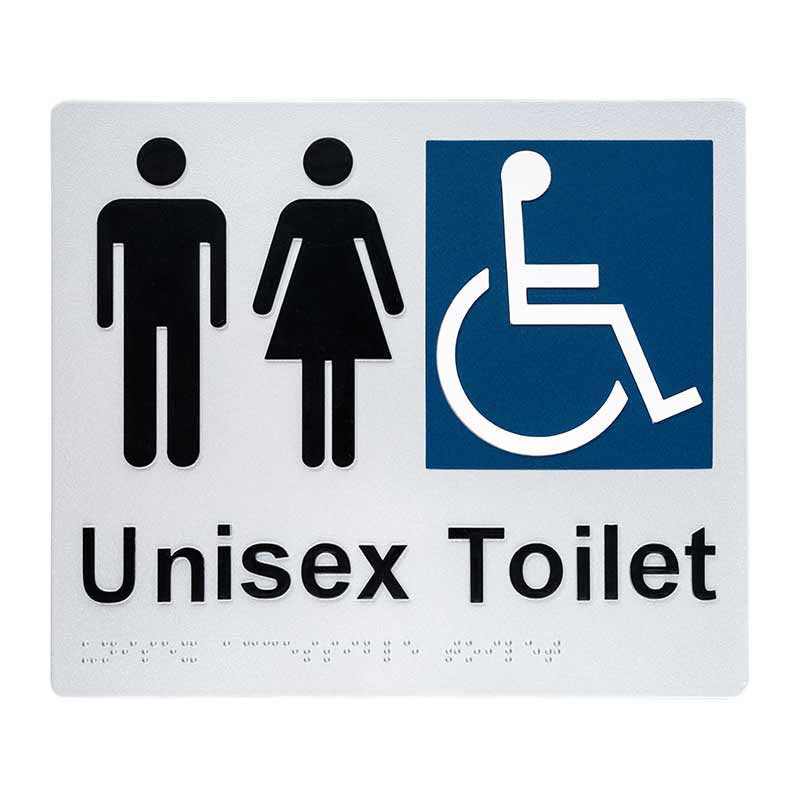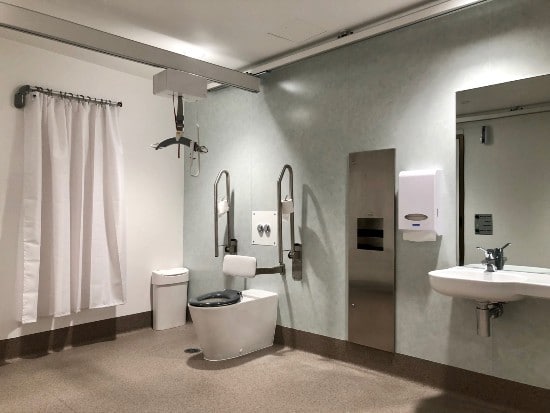Ms. Joe Manton, Director Access Institute
After spending my very early years trudging through the back yard to the outdoor ‘dunny’ in the winter, I developed a great appreciation, as did many others, for a comfortable, warm, clean, ‘spider free’ toilet, as these were introduced to homes across the country. Of course, you just need to go ‘up the country’ to see some of these iconic outhouses still in operation but they are more often a nod to the past, rather than a preferred place to spend time.
The fact that we all need to use toilets every day, means that consideration must be given to the toileting needs of everybody. So, let’s talk toilets.
Of course, the most common types of toilets we see installed in public places include standard male and female toilets. These serve the purpose for many people and also used to mean that property owners could comply with minimum required legislation. However, over the years recognition of the needs of more people and other users of toilets, have been recognised as important considerations in developing inclusive communities.
Unisex accessible toilets are required where male and female toilets are provided. These toilets incorporate a larger space where a person using a wheelchair can access the toilet pan, grab rails and other fixtures, as well as a washbasin inside the cubicle that support a person who may be using toileting equipment or who needs to access water or washing facilities. These toilets must be Unisex because a person may need assistance from a carer or support person to get in or use the toilet. This could include people who identify as males or females or others. It is not appropriate to install an accessible toilet in a gender specific facility.

Anyone can use a Unisex Accessible Toilet. It’s just a toilet with more space and supports. If a person was using a Guide Dog and needed more space to take the dog with them, then a Unisex Accessible Toilet would be helpful. If a parent with a pram needs more space this would also often be a suitable facility.
One of the challenges we have in the built environment, is that we usually only build to comply with minimum access standards and legislation, rather than considering the principles of Universal Design, which support and consider the needs of all users. Therefore, we only build the minimum number of accessible toilets, specified in legislation. This minimum compliance only targets some people with disabilities, not everyone who may need to use a Unisex Accessible Toilet, therefore, we tend not to build enough of them. Forward thinking developers build more than the minimum to support a broader user base.
Ambulant Toilets are also mandatory where male, female and unisex accessible toilets are provided. Ambulant toilets cater for the needs of users who may be using a mobility aid such as a walking frame, cane, or crutches and where a person may need support from grab rails on both side of the toilet pan. An Ambulant Toilet must have sufficient room in front of the pan for a person to be able to get to the pan easily if using a mobility aid. In addition, if the facility is designed correctly, a person who may be pulling luggage can get into the Ambulant Toilet. At an airport we are not permitted to leave luggage outside in a public space when we go to the toilet.
Accessible Adult Change Facilities (AACF) have also been introduced in more recent years, and are now a mandatory requirement in some larger buildings. These facilities (often called Changing Places initially funded by the State government), have been installed in Victoria for more than 10 years at a variety of high use public locations. In addition, a number of private organisations have also self-funded these in a number of shopping centres. These facilities incorporate a large space which includes equipment that may be required to assist a person with high physical support needs when using a toilet. An adjustable height adult change table. a hoist, a peninsular style toilet that provides access from both sides for a carer to support a user on the toilet, as well as a washbasin and sometimes shower are all included. Accessible Adult Change Facilities are critical if a person with high physical support needs is going to be able to participate in all of the activities that many of us take for granted. For example, on talking with women who needs an AACF, who was going to the MCG, she commented that she was going there for the first time at the age of 23, because now they have an AACF. Prior to that she could not go as there was nowhere she could go to the toilet.

If these facilities are not provided in large venues where people would typically congregate for long periods of time, then some people will not be able to go to the venue or participate in events or activities on offer. If a person wished to attend, they may need to medicate to adjust their toileting regime or be changed on the floor of a unisex accessible toilet. Both of these options are unacceptable and create significant inequitable barriers to inclusive communities.
All Gender Toilets are also an important consideration in the provision of toilets for everyone. Whilst these toilets are not yet mandatory, according to Melbourne University, research indicates that ‘Bathroom Anxiety’ is a phenomenon experienced by gender diverse people when an appropriate toilet facility is not provided. This leads to increased levels of anxiety and depression and lower levels of class attendance at the University. Extensive consultation found that the term ‘All Gender’ is preferred to ‘Gender-Neutral’ or ‘Unisex’ and is the most inclusive of the broad spectrum of gender. Everyone needs to feel comfortable and safe when using a toilet.
Assistance Animal Relief Areas are also in high demand by users of Guide Dogs and other assistance animals that provide support and comfort to many users. An Assistance Animal is specially trained to perform specialised tasks that their owner is either incapable of doing or would have difficulty in doing themselves. Usually dogs are trained as Assistance Animals due to their intelligent nature and strong connection with humans. however. this doesn’t mean other kinds of animals are incapable of serving as a service animal. Assistance Animals such as miniature horses and are also used as Guide Horses to support people with vision loss and are also becoming more popular. This may be due to the person having an allergy to dogs or perhaps for cultural reasons. Assistance Animals are often used to support a person who is blind, a person who is deaf, a person with mental health issues such as post traumatic stress disorder (PTSD), as well as a person who may need help carrying things or opening doors. There are also Assistance Dogs for children with epilepsy and autism that provide comfort and support and reduce anxiety. The list is extensive.
If a person using an Assistance Animal is travelling or staying in a venue for a long period of time, they will need access to toileting facilities for the animal. In Australia we are seeing more venues such as airports, train stations and sports venues providing Assistance Animal Relief Areas. For example, Brisbane Airport Assistance Animal Relief Areas allow a person to toilet their animal just prior to boarding a plan. These are located in the same areas as the male. female and unisex accessible toilets and incorporate a range of equipment suitable for animal toileting. Adelaide Airport also has an facility outside the entrance to the terminal. Train stations are including these in station and facility upgrades and new developments.
Organisations that are committed to inclusive communities are considering the needs of all users when it comes to toilets. They understand that Good Access is Good Business© and the more appropriate the facilities in catering to the needs of more users, the more people will use the facility.
We have come a long way since the outdoor dunny was the benchmark for toilets. In the words of an AACF user – Liz Ellis, it should not be a privilege to go to the toilet, it should be a right.